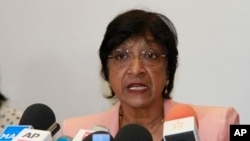A U.N. fact-finding mission blames what it calls the “perpetual occupation” of Palestinian areas by Israel as the root cause of ongoing violence in this volatile region. The Commission of Inquiry on the Occupied Palestinian Territory, including East Jerusalem, and in Israel has submitted its first report to the U.N. Human Rights Council.
The report by the three-member commission, which was established in May, has generated a lot of interest and offended many supporters of Israel who consider the findings biased.
In presenting the report to the council, commission chair Navi Pillay said decades of forced displacement, demolitions and the blockade of Gaza have contributed to the cycles of violence. She said it has created a sense of despair and hopelessness within the Palestinian population in the occupied region, as well as in Israel and the diaspora.
She said successive Israeli governments have developed policies to entrench complete control over the entire occupied Palestinian territory and the Golan Heights. Israel has occupied the Golan Heights since capturing the area from Syria in the 1967 Middle East war.
“This continued situation of occupation and discrimination is being used by Palestinian duty bearers to justify their own violations and abuses of international law, including the failure of the Palestinian Authority to hold legislative and presidential elections,” Pillay said
Israel showed its contempt for the commission by boycotting the meeting. Many members of the council voiced their approval of the report and registered their support for the Palestinian position.
Pillay criticized the de facto authorities in Gaza for showing little adherence to international humanitarian law. She placed most of the blame for continued violence on the excessive use of force by Israeli security forces. Pillay said Israel has engaged in hostilities against Palestinians with impunity. She said impunity increased resentment and distrust and compromised chances for achieving sustainable peace.
“Policies of occupation, dispossession, and discrimination can only translate into increased hatred and further acts of violence," Pillay said. "These acts of violence serve to fuel further endless cycles of conflict on both sides.”
The three-member panel said it regretted Israel’s refusal to cooperate with the commission’s inquiry. It said Israel refused to grant the commission access to Israel and the state of Palestine to interview people and gather information.
Israel had its defenders. The U.S. ambassador to the U.N. Human Rights Council, Michele Taylor, spoke on behalf of 22 countries. She expressed their concern about the long-standing disproportionate attention and scrutiny of Israel in the council. She said this must end and that Israel’s human rights situation must be treated in an even-handed manner.

